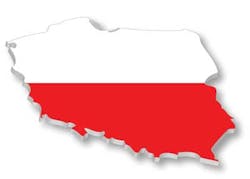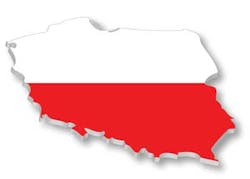Joined-up Thinking Needed for Poland's WFD Compliance
Many European Member States have found implementation of the Water Framework Directive challenging, even the likes of Germany. Yet Poland has been called by up the EC for failing to enact the regulation. WWi looks at how this came about in the country and the knock on effect it could have across Europe.
The news that the European Commission is referring Poland to the European Court of Justice (ECJ) for failing to fully enact the Water Framework Directive (WFD) in its national legislation is not entirely a surprise.
Poland has also been called before the ECJ for not complying with the regulation on nitrates and water pollution, and is one of a number of countries struggling with the requirements of the complex WFD.
Poland's water legislation has various shortcomings, according to the EC, about which it has been sending the country official letters since 2008. Despite various reminders and Poland both replying and taking various actions, the EC was not satisfied and issued a 'reasoned opinion' – the first step in the process of moving towards an ECJ action – in 2010. In response Poland revised its water legislation in 2011 and adopted various regulations, but sufficient concerns remained for the EC to proceed with court action.
"Cause for Concern"
The EC notes in its defence of the procedure that it is particularly concerned about the absence of Annex II, which sets out the characterization system for surface waters and groundwaters, and omissions in the transposition of Annex III. The latter is supposed to provide a vital range of framework data - specifications and reference points for river basin district (RBD) analysis, reviews of the environmental impact of human activities on water, and the economic analysis of water use. Monitoring of water status is also listed as a "cause for concern".
The logic behind the action is that for the WFD, seen as a key tool in protecting Europe's waters, member states must prepare an RBD analysis, reviewing the environmental impact of human activities on water and analyzing economic aspects of water use. This analysis is seen as an 'indispensable step', and one that acts as the basis for many of the Directive's other requirements.
Because of this, the EC believes that incomplete or inadequate transposition of the Annexes (which pave the way for this work) is likely to lead to a faulty analysis. This, they say, would in turn affect river basin management plans (RBMPs) and have potential further effects on human health and water quantity and quality.
Poland is far from alone in its troubles, however. A UK Lords Select Committee report on EU freshwater policy in 2012 collated the opinions of a number of experts on the WFD among other legislation. Serious and widespread fundamental issues were highlighted.
The preamble notes: "Many, if not all, Member States have found implementation of the WFD challenging. Preparation of RBMPs has required major efforts. At the beginning of 2012 four Member States – Belgium, Greece, Portugal and Spain – had not yet adopted RBMPs, and the EC had taken legal action against them. Belgium, Greece and Portugal were at that time expecting to adopt RBMPs that year, with Spain due to follow in 2013."
The Lords' conclusions warn: "Incomplete implementation across the EU as a whole brings the risk that a proper assessment of the impact of the WFD may be hampered by the lack of evidence from Member States that have not yet put the Directive into practice, and this in turn impedes any process of identifying changes that may need to be made."
Disconnect
The committee also heard from Frédéric de Hemptinne, ex Secretary-General of Eureau and now an environmental consultant with deep expertise in EU water policy, about the difficulties Member States had encountered.
M. de Hemptinne saw four key obstacles – costs that were not foreseen when the Directive was adopted; the scale of change required, which had necessitated new approaches to coordinating different agencies within Member States; the innovative nature of the participative and inclusive approach to catchment management; and the extent to which the holistic approach of the WFD has brought to light previously unforeseen problems.
Even Germany, one of the leaders in implementing EU legislation, told the committee that it would have problems achieving WFD objectives and would extend deadlines from 2015 to 2021 and 2027.
Germany's complex three-tier state administrative structure has been an obstacle in this instance, with information failing to filter down to the lower levels. An EC report from last November on Poland's implementation of the WFD RBMPs shows similar disconnects and multiple layers of authority and responsibility.
The report notes that "there is no integrated approach on water management and that there seems to be a disconnection between water management and the environmental objectives of European water legislation. There is also no evidence of an integrated policy approach between water management and other related policy areas such as navigation, energy production, flood protection, agriculture, etc."
The report pinpoints a lack of consistency (speaking of problems with 'intercalibration'), an issue that extends beyond the WFD to other European legislation such as the Environmental Noise Directive (END), where a lack of uniform data has proved problematic.
M. de Hemptinne told WWI: "Intercalibration is obviously an issue. If you look back, in 2000 the WFD stated the need to restore ecological quality but we couldn't define it so we needed an intercalibration exercise, which is not yet finished – it is crazy. However, it is a good thing that the WFD has prompted changes. People are gathering more data, and it has triggered institutional change."
To take one example, Poland has designated around 30% of its surface water bodies as heavily modified (HMWBs), with additional reports providing details of the methodology used to determine these, the indicators used to assess them and various smaller Regional Water Management Board reports.
However, despite this apparently massive data exercise, the EC concluded that it could not find details of how the methodology was applied and could not therefore state that the actual designation of HMWBs was carried out in line with the WFD. Poland was tasked with undertaking further work to verify its designations. The report also noted gaps and inconsistencies in information reported to WISE.
Unrealistic goals?
Further evidence of problems comes from a 2010 European Environmental Bureau report on the WFD that concluded that at that time, in general RBMPs were "useless" for their purported aim of checking measures to restore specific water quality elements and the level of environmental ambitions because of a lack of data.
This document also found "massive procrastination" in restoring surface waters "based on generic excuses stating high costs and lack of knowledge", a "business as usual" approach to nutrient pollution control, and very limited progress. Robust parameters, it warns, "are unnecessarily drowning in complexity and ignorance".
Despite the apparent failings in implementation of the WFD, the Lords witnesses, while highlighting the significant difficulties, nevertheless agreed that the legislation has been a force for good in EU water resource management. The Lords also concluded that expectations that changes should be made to the core elements of the WFD in the short term "are unrealistic, and unjustified".
However, some movement at a practical level may occur. M. de Hemptinne notes: "We start the second planning cycle very soon. There is a general feeling people are not so happy with the outcomes of the first planning cycle – the WFD has cost a lot of money and involved a lot of effort, and has not delivered as much as expected."
He observes that "in the WFD there are a few design mistakes – it was one of the last directives adopted without an impact assessment. For instance, hydromorphology was an issue whose impact was totally underestimated. At the time the WFD was transposed by the Netherlands, it was realised that if the directive was interpreted in a literal way, all the territory should have been classified as a heavily-modified water body."
In fact, he adds, the WFD was adopted on the belief that ecological restoration will be produced by better coordination of existing efforts with additional efforts in a limited number of cases.
Clever thinking
M. de Hemptinne notes that the enthusiasm of the WFD's creators has sometimes not taken account of practicalities on the ground, adding: "Sometimes the EU has a bad habit of thinking that being clever will solve problems. Designing a clever solution doesn't mean that it will work and will be feasible for people in the field."
However, he adds that it could be argued that adopting a very ambitious plan was the right thing to do. "You should be ready for change. If you are serious about doing something the WFD is a helpful tool. But if you are not serious, and don't want to do something, you can hide under the complexity of the instrument."
Initially, he explains, the tools to achieve the WFD's ambitious aims were not available but these are now emerging – for example, modeling and reporting systems. For countries such as Poland, implementation remains an issue but one that is evidently worth tackling given water's critical importance.


